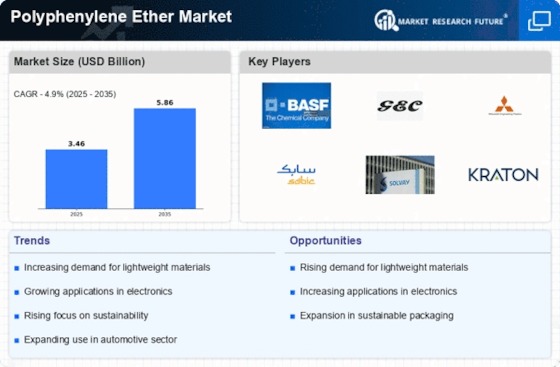Top Industry Leaders in the Polyphenylene Ether PPE Market
 In the realm of high-performance polymers, Polyphenylene Ether (PPE) reigns supreme. Renowned for its exceptional blend of lightness, heat resistance, and chemical resilience, PPE finds itself gracing diverse applications, from sleek automotive parts to robust medical devices. Naturally, this lucrative market has become a battlefield for established players and ambitious newcomers alike, each vying for a larger slice of the pie.
In the realm of high-performance polymers, Polyphenylene Ether (PPE) reigns supreme. Renowned for its exceptional blend of lightness, heat resistance, and chemical resilience, PPE finds itself gracing diverse applications, from sleek automotive parts to robust medical devices. Naturally, this lucrative market has become a battlefield for established players and ambitious newcomers alike, each vying for a larger slice of the pie.
Strategic Maneuvers: Gearing Up for Growth
To navigate this dynamic landscape, leading companies like SABIC (GE), Asahi Kasei Chemicals, Bluestar, and Mitsubishi Chemicals have adopted a multi-pronged approach. Product diversification takes center stage, with players like SABIC introducing new grades of PPE suited for specific applications like electronic substrates. Geographical expansion is another key driver, with Asahi Kasei establishing new production facilities in China to cater to the burgeoning Asian market. Strategic partnerships are also forming, as evidenced by collaborations between Bluestar and Evonik to tap into underutilized market segments.
Market Share Mosaic: Beyond Price and Performance
While price and performance remain crucial factors influencing market share, the PPE landscape is far more nuanced. Brand reputation plays a significant role, with established players like Asahi Kasei enjoying a head start built on years of quality and reliability. Vertical integration offers another edge, allowing companies like SABIC to control the entire supply chain from feedstock to finished product, thereby optimizing costs and ensuring consistent quality. Additionally, investments in research and development are critical for staying ahead of the curve. Companies like Mitsubishi Chemicals are actively exploring applications of PPE in cutting-edge fields like fuel cells and membranes, ensuring future market relevance.
Market Summary: A Glimmering Trajectory
Despite facing headwinds like volatile raw material prices and geopolitical uncertainties, the Polyphenylene Ether market boasts a robust future. This growth is largely driven by the surging demand for lightweight materials in the automotive and electronics sectors, coupled with increasing adoption in medical and infrastructure applications.
Key Players
- Asahi Kasei Corporation (Japan)
- BASF SE (Germany)
- Evonik Industries AG (Germany)
- Entec Polymers (US)
- LyondellBasell Industries Holdings B.V. (the Netherlands)
- Mitsubishi Chemical Corporation (Japan)
- Oxford Polymers (US)
- Polyplastics Co. Ltd (Japan)
- SABIC (Saudi Arabia)
- Sumitomo Chemical Co.Ltd. (Japan)
Recent Developments:
-
September 2023: Asahi Kasei unveils bio-based PPE, capitalizing on the growing demand for sustainable materials. -
October 2023: SABIC partners with a Chinese automotive tier supplier to develop lightweight components for electric vehicles, leveraging PPE's strength-to-weight advantage. -
November 2023: Mitsubishi Chemicals enters a joint venture with a Korean company to manufacture specialty PPE grades for medical applications. -
December 2023: Bluestar secures regulatory approval for its new flame-retardant PPE resin, opening doors to applications in building and construction.










